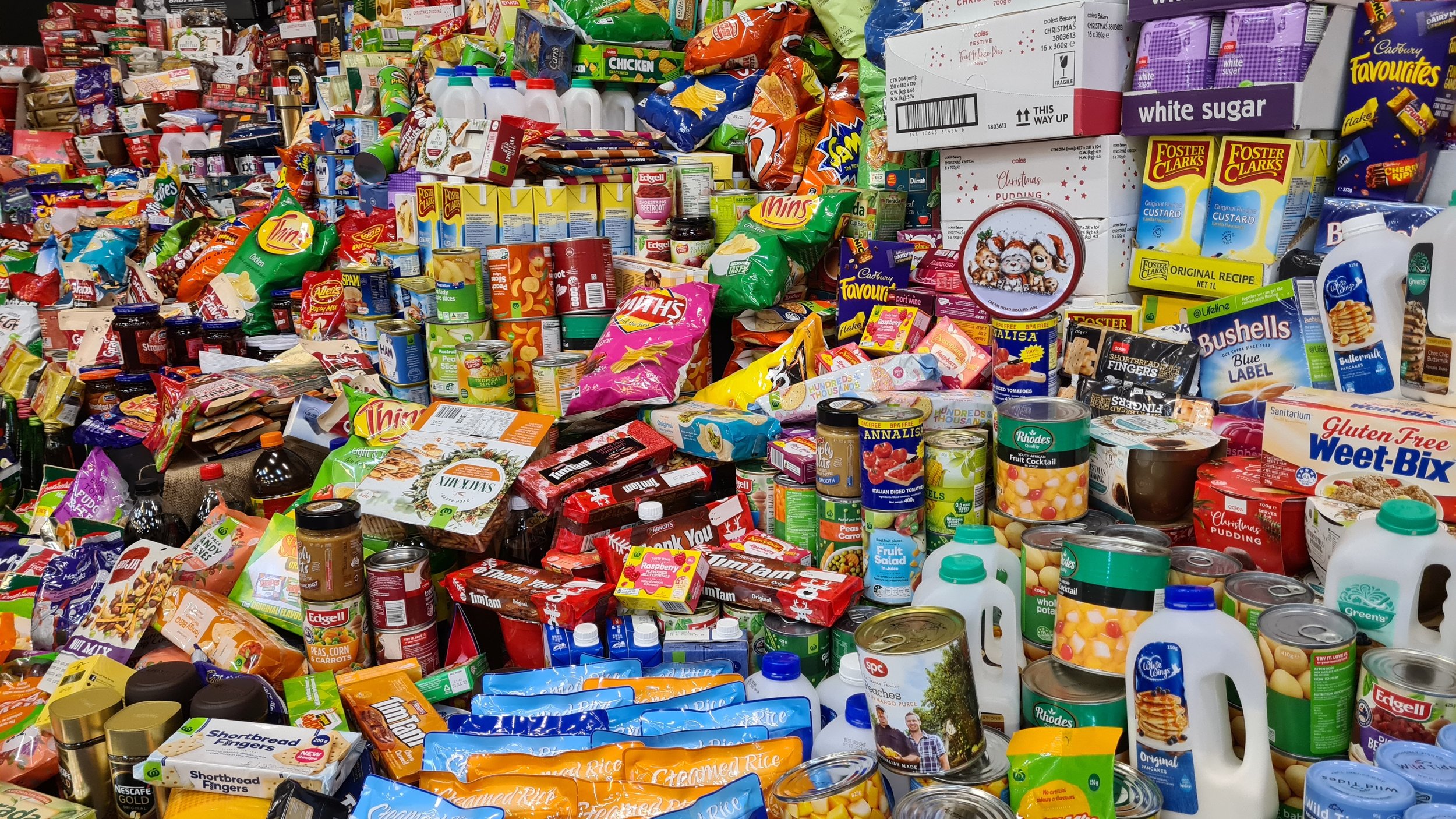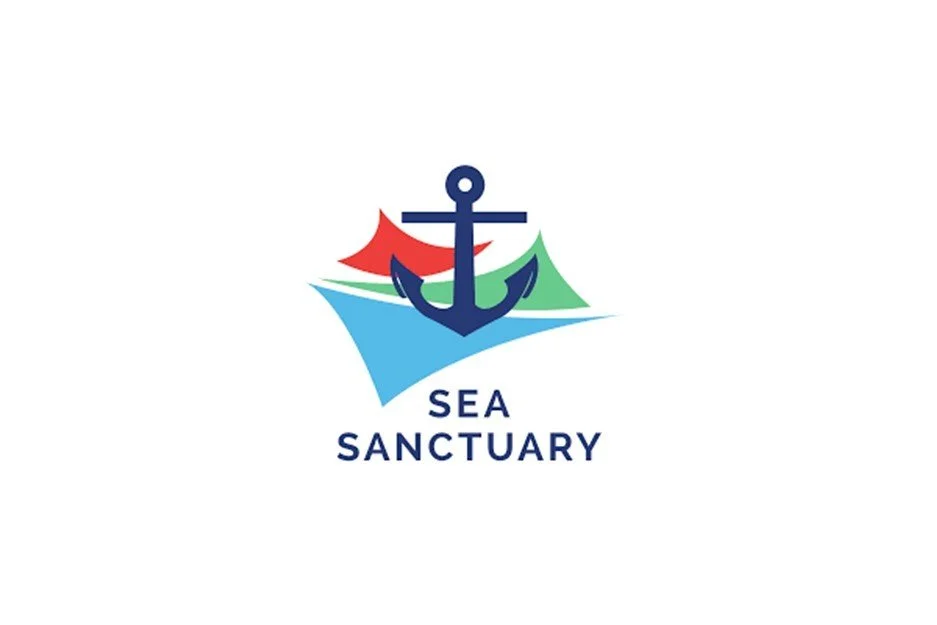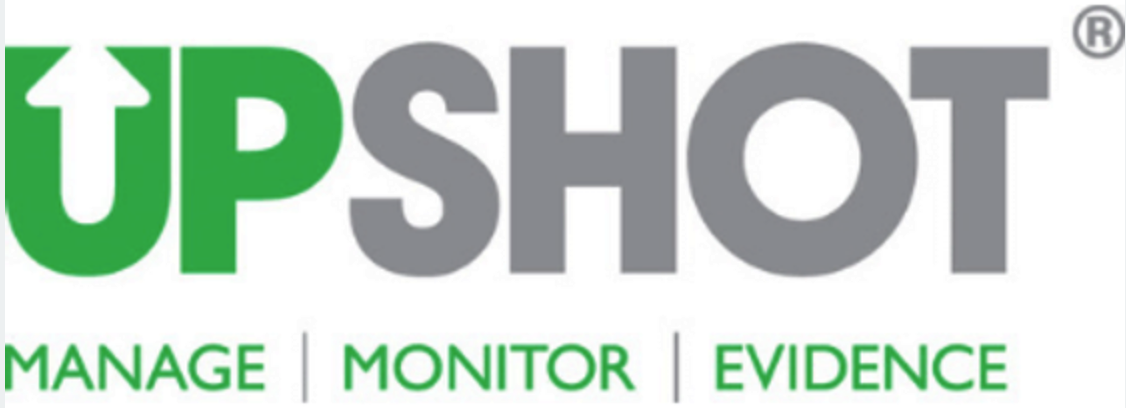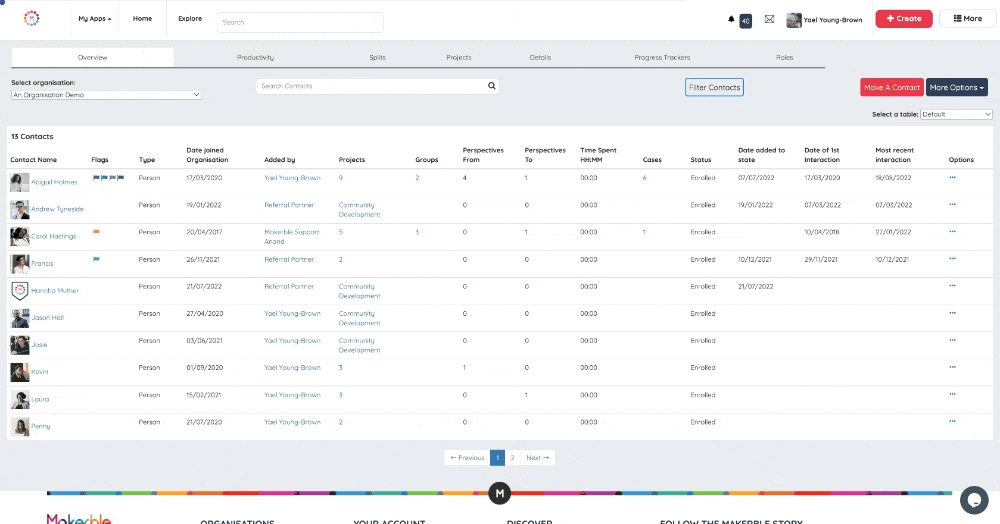Collating progress updates in spreadsheets is always a painful process. Instead of spending time chasing people for the latest update, you can empower your programme partners to share their own progress on an interactive dashboard that inspires reflection and evokes pride.
Track people's survey responses over time
Collect aggregate survey results
Collect aggregate-level survey results by simply keying in the number of people who gave each answer to each question. Makerble has a dedicated Aggregate Survey Results mode. This means you can work still collect impact information from partners and colleagues even when they’ve used different methods to collect their survey results
Plus Forth Valley use Makerble to manage service delivery to children and young people living with disabilities
Somerset County Council - a Makerble client
The project Somerset County Council manages using Makerble
Somerset County Council runs an opportunity boost scheme called Step Up. It provides grants worth up to £500 to help overcome financial barriers when seeking employment and returning to work. The grant can cover costs such as transport, childcare, work clothes, learning resources and training courses.
Find out more about Step Up Somerset here.
Foyle Foodbank - a Makerble client
About Foyle Foodbank
Foyle Foodbank is a Trussell Trust foodbank. It provides three days of emergency food to those facing food poverty in Londonderry, NI.
Find out more about the foodbank here.
Communities First - a Makerble client
About Communities First
Communities First Foundation offers a wide range of services to tenants and young people in social housing across England and Wales. In addition, they offer sports, training and employment programmes to young people.
Find out more about the organisation here.
Explore Partnership use Makerble to monitor immediate and long-term impact of their project
Buttle UK - a Makerble client
As Buttle UK embark on a new strategy they have embraced a new way of working that enables them to work closer with the people they serve than ever before. Coproduction is a key tenet of how Buttle UK is working and they are using Makerble’s CRM system to manage their interactions with the referrers and beneficiaries they work with.
5 thing that happened in the Charity sector this week - 27th January
Makerble Charity Roundup
Growing cyber threat to charity sector, NCSC reports
A new National Cyber Security Centre report has outlined why organisations in the charity sector are particularly vulnerable to cyber attacks in comparison to businesses and government organisations. For example, is less likely to have organisational IT, relying predominantly on staff’s personal devices, which are harder to secure. A cyber attack could affect a charity’s services, data and funds. The report directs staff and trustees to the online resources they need to safeguard their organisation. Read the full report here.
Economic and social progress dependent on sectors working together
A two-year commission created by Pro Bono Economics in 2020 has called for government, businesses and funders to support charities in national recovery and growth. The report, Unleashing the power of civil society, sets out recommendations on collaboration between the sectors. The Chair of the Commission, Lord Gus O'Donnell summarised “Successive governments have neglected charities for too long, and our country is the worse for it. That must change in order to achieve the national renewal and better future that the UK desperately needs, because charities are a key part of the solution to every challenge we face.”
Record number of wills included a gift to charity in 2022
The total value of charitable estates in 2022 currently stands at a record breaking £2.1bn. Some organisations are yet to report there final accounts to the Charity Commission, so Smee & Ford estimates the actual figure to be around £3.5bn. Of the wills handled by Smee & Ford last year almost 16% included a gift to charity, which is also the highest amount it has ever recorded.
Strong communities: The backdrop to the cost-of-living crisis
The National Lottery Community Fund’s latest Community Research Index, a survey of 8,000 adults across the UK, shows that eight in ten people are expecting the demand for their local foodbank to increase, and three in four people predict an increase in demand for mental health services and the need for debt support. However, there is a growing sense of community, with more people saying they feel a connection to their local community compared to previous years. 49% of people plan to volunteer in 2023, with a clear focus on food banks. 42% of those intending to volunteer plan to offer their help to a food bank. Over half of UK adults think that support those struggling because of the cost-of-living crisis is important to the well-being of their local community.
South London community farm to launch food growing project to help residents
Around ten years ago Loughborough Junction Action Group turned a vacant open space in South London into a thriving community farm. The charity recently received £84,500 of funding to help people learn to grow their own food. They will hold 100 growing session a year as well as workshops on healthy eating and horticulture, to encourage people to grow food on their balconies or in their gardens. The project hopes to bring together the community improve the environment and support local residents.
Sources:
https://www.ncsc.gov.uk/blog-post/phishing-and-ransomware-amongst-biggest-threats-to-charity-sector
https://fundraising.co.uk/2023/01/26/economic-social-progress-in-uk-dependent-on-sectors-working-together-commission-concludes/
https://fundraising.co.uk/2023/01/26/2022-saw-charities-receive-highest-number-of-bequests-on-record/
https://www.charitytoday.co.uk/community-connections-strengthen-despite-cost-of-living-pressures/
https://www.charitytoday.co.uk/south-london-food-growing-project-will-help-hundreds-more-residents/
5 things that happened in the Charity sector this week - 20th January
Makerble Charity Roundup
Amazon shutting down the AmazonSmile charity programme
For almost a decade Amazon has been running AmazonSmile, a donations programme that allowed buyers to give to charity with each purchase at no extra cost to the customer. The company announced that it will be shutting down the programme by the 20th of February, as it did not “grow to create the impact that [was] originally hoped”. Amazon has donated almost $500 million over the last decade. It claims the impact was minimised by the fact the programme was spread too thin, with over 1 million eligible organisations around the world. However, critics have speculated that this is no more than a cost-cutting tactic.
Over 100 charities call on government to help most vulnerable heat their homes
Over 100 charities sent an open letter to Chancellor Jeremy Hunt calling for a social tariff for the energy market to support older and disabled households. Age UK’s polling shows that 24 per cent of over-60s and 27 per cent of older disabled people are living in colder conditions at home than they would like. Organisations like Age UK and Scope have expressed concern that even as the weather gets warmer many older and disabled people will face struggles as universal energy support comes to an end in April. People relying on medical equipment, for example, are facing a daily struggle to heat their homes and keep the equipment running. The open letter has called for targeted support for people on means-tested benefits, disability benefits, Carer’s Allowance, and those that may not qualify for welfare support but are still struggling with their energy bills.
Guardian and Observer raise £1.5m for charities tackling cost of living crisis
The Guardian and Observer charity appeal has closed, having raised over £1.5m over a 38-day campaign, with donations from more than 13,400 people. The money will aid charities working on the frontline of the cost-of-living crisis. It will be split between Citizens Advice and Locality and will go towards local services in the most deprived communities in the UK, helping provide emergency food banks, warm rooms, mental health services, and debt and housing advice.
CEO to cycle to Ukraine to raise money for landmine charity
CEO Tom Hashemi is embarking on a journey from London to Lviv, Ukraine to raise money for the Mines Advisory Group. The route will be 2,000km which he will cycle over the course for two weeks in April. He was inspired to organise the ride when he found out that children are particularly likely to be mine casualties when out playing. He hopes to raise £20,000. It costs approximately £500 to clear one landmine and he plans to raise enough to clear at least 40.
Fast approaching early bird entry deadline for Business Charity Awards
The Third Sector Business Charity Award are an amazing opportunity to showcase a collaboration between a not-for-profit organisation and a corporate partner. There is a list of 20 categories you can enter, including Best Response to the Cost-of-Living Crisis, which is a new category and is free to enter. The early bird entry deadline is just a few days away, on Thursday the 26th of January. Follow this link to enter https://www.businesscharityawards.com/
Sources
https://www.engadget.com/amazon-shutting-down-amazonsmile-charity-program-061835108.html
https://www.familyfund.org.uk/news/over-100-charities-call-to-introduce-new-social-tariff
https://www.theguardian.com/society/2023/jan/16/guardian-and-observer-charity-appeal-closes-with-more-than-15m-raised
https://www.bbc.com/news/uk-england-london-64330246
https://www.businesscharityawards.com/
5 things that happened in the Charity sector this week - 13th January
Makerble Charity Roundup
1. Reduced energy bill support for charities from April
Currently, under the Energy Bills Relief Scheme (EBRS) non-profit organisations receive a discount on their energy bills. Chancellor Jeremy Hunt announced this week that in from April this scheme will be replaced by the Energy Bills Discount Scheme (EBDS). Whilst plans for ongoing subsidies from the government are welcome, the level of support in the upcoming financial year will be significantly lower. Over the last six months the EBRS cost approximately £18.4bn. The EBDS, however, will be capped at £5.4bn government spending for the whole year. Charity sector bodies have urged the government to find a longer-term solution to support non-profit organisations.
2. Trust founder completes 52 triathlons in 52 weeks
Rob Starr, 53, is the co-founder of the Starr Trust, which supports young people in achieving their dreams. Over the last year Mr Starr has done a triathlon every Friday, which has helped raise over £100,000 for his trust. He did most of the triathlons around Brighton. Travel and bad weather did not ever stop him. Some triathlons he did abroad, the furthest from home was in South Africa. When the weather was awful, he would swim in a pool and use an indoor bike, but always tried to run outside. Mr Starr received support from his friend Sir Daley Thompson throughout this challenge.
3. Wolves fans raise almost £2,000 for Race Against Blood Cancer
In 2017 former club goalkeeper Carl Ikeme was diagnosed with leukaemia. He went into remission in 2018 and has since supported the local Race Against Blood Cancer charity. He previously supported a donor drive, which aimed to increase the number of stem cell and bone marrow donor from minority groups, which are vastly underrepresented. Recently Ikeme’s fans began fundraising for the charity to help others fighting the same condition. A Wolves fans volunteer group held a quiz night that raised £1,785.
4. Exmouth man to walk UK coastline to support the RNLI
Tim Jones, 33 and his dog Monty will be starting their route around the UK coastline at Exmouth RNLI Lifeboat Station next Friday. He will walk “clockwise”, visiting as many lifeboat stations as he can. His 8,000-mile route includes the Isle of Man and the Scottish Islands. He hopes to raise £500,000 for the RNLI, which he has admired for a long time.
5. Charity that supports refugees and asylum seekers moves to a bigger facility
The number of refugees and asylum seekers using The Harbour Project’s services has trebled in the last two years. To meet the growing need, the Swindon-based charity is moving to a new facility funded by the charity itself and South Swindon Parish Council. The charity support refugees and asylum seekers in rebuilding their lives. Around 1,500 people are currently seeking refuge in Swindon and the charity was not able to support all of them in its former office. The CEO Claire Garrett said “Our role here is to respond to human needs, I’m never going to turn anyone away at the door.”
Sources:
https://www.civilsociety.co.uk/news/treasury-announces-reduced-energy-bills-support-for-charities.html
https://www.thejc.com/news/community/what-a-starr-charity-chiefs-52-triathlons-in-52-weeks-raise-over-100000-1LCMBvhPCwL8RKX7lpPT40
https://www.expressandstar.com/news/local-hubs/wolverhampton/2023/01/12/almost-2000-raised-by-wolves-fans-for-blood-cancer-charity/
https://rnli.org/news-and-media/2023/january/13/exmouths-tim-to-walk-the-uk-coastline-for-the-rnli
https://www.bbc.com/news/uk-england-wiltshire-64225655
5 things that happened in the Charity sector this week - 6th January
Makerble Charity Roundup
1. New research predicts 2.5 million extra volunteers for charities
Pro Bono Economics think tank predicts that this year there will be a rise in volunteers, particularly young people between 11 and 34. A recent study shows that more than 10 percent of people not currently volunteering in the UK, intend to start donating their time to help a group, club or organisation in the new year. Even though volunteers bring in some additional costs in the form of training, this is still a positive forecast following the sharp drop in volunteer numbers during the pandemic.
2. The Trussell Trust raids its reserves to help foodbanks cope with the cost-of-living crisis
In 2021/22 The Trussell Trust went from a £40m surplus to a £16m deficit. Demand for foodbanks has been growing for over a decade. In the last four years the need for emergency food parcels has increased by 80 percent. The most recent cost-of-living-related surge in demand has seen Trussell Trust grants to foodbanks increase seven-fold between 2021 and 2022. In October the charity launched an appeal to support it though “the most challenging winter” in its history.
3. Sea Sanctuary mental health charity closing its doors
For the last 13 years Sea Sanctuary has been offering “blue therapy” to people struggling with their mental health. This “blue therapy” included trips on barges and yachts. The Cornwall based charity launched a fundraising appeal in 2022, hoping to raise £200,000 before the end of the year. Unfortunately, despite public efforts, they were not able to meet this goal. Joe Sabien, the founder of Sea Sanctuary announced on Tuesday that the charity would be closing. They will be refunding donations and distributing surplus funds to local mental health charities.
4. Changing Lives charity receives £1.3m from the Home Office
Changing Lives secured £1.3 million to go towards their work tackling violence against women and girls in the North East. The charity focuses on helping women targeted for sexual exploitation, including grooming online and tech abuse. The three-year funding will allow them to expand their specialist team, who will support vulnerable women and prevent sexual abuse and exploitation.
5. Give A Duck receives £10,000 from Morrisons Foundation
Give A Duck is a kids cancer charity that helps children through their cancer treatment by providing them with a cute soft toy “Chemo Duck”. It is fitted with a Hickman Line and Portacath so that medical staff can demonstrate the treatment on Chemo Duck before it is administered to the child. The Chemo Duck provides comfort to the children during treatment and also helps them understand their treatment. The Morrisons Foundation offered Give A Duck a grant of £10,000, which equals 400 Chemo Ducks.
Sources:
https://www.thirdsector.co.uk/charities-set-25-million-extra-volunteers-report/fundraising/article/1809113
https://www.thirdsector.co.uk/charity-goes-40m-surplus-16m-deficit-year/finance/article/1809136
https://www.thirdsector.co.uk/mental-health-charity-close-200k-fundraiser-falls-short/finance/article/1809202
https://www.chroniclelive.co.uk/news/north-east-news/changing-lives-charity-secure-13-25902163
https://www.wakefieldexpress.co.uk/business/wakefields-morrisons-j41-logistics-warehouses-ps10k-boost-to-childrens-cancer-charity-give-a-duck-foundation-3953646
Reach Children's Hub use Makerble to manage their work with families in Feltham
Administrative tools for Monitoring, Evaluation, Research and Learning
Readiness Indicators: the early warning signals that prevent programmes from failing
Case Study: Friends of the Earth
7 Questions Every Manager Needs To Ask When Planning Their Programme's Monitoring & Evaluation
How to describe your outcome measurement approach in a funding application
When you’re writing a funding application and you reach that dreaded part that asks about your impact measurement approach or outcome framework, don’t worry - help is at hand!
The funding application question
How will you measure your impact:
How personal outcomes will be measured and evidenced, including the measurement tool(s) that you plan to use
How you plan to measure progress against outcomes over a period of time; and
Systems and business processes you will put into place to manage and demonstrate performance and underperformance.
How you could answer it
Outcomes will be measured by doing a pre-programme baseline assessment followed by a mid-programme midline assessment and then finally a post-programme endline assessment. The assessment will be a survey composed of questions that ask the client to rate themselves using various scales such as a Likert scale, for example "To what extent do you agree with the statement: I feel like I am able to use my time productively" from Strongly Disagree through to Strongly Agree.
As well as using the questions with a scale, we will ask each client to explain why they rated themselves that way. This response will be captured as text and will provide further evidence of why the rating is at it is.
Our case management system, www.makerble.com, allows us to track the Distance Travelled for each client's responses to each question over time. This will allow us to see for example the number of clients who have gone from (at the start of the programme) saying that they strongly disagreed that they were able to use their time productively to Agreeing or Strongly Agreeing that they could use their time productively.
Our case management will show us every distance travelled journey; which means that we will also notice the clients for whom there has been little to no improvement.
This means that we can identify the clients who are underperforming from an outcomes perspective. We can then work as a delivery team to adjust our approach to ensure that we tailor our support appropriately to help those clients onto a journey of improvement.
Considerations
When a funder asks you which Measurement Tools you will use specifically, they might be asking you to specify the survey you intend to use. There are various surveys available on www.Makerble.com/explore/surveys that you could pick from, e.g. the CORE10 (More info: https://www.corc.uk.net/outcome-experience-measures/core-measurement-tools-core-10/) which is available on Makerble: https://www.makerble.com/story_categories/2596.
Disclaimer: We wish you all the best with your funding application however Makerble accepts no responsibility if your funding application is unsuccessful.
Upshot alternatives: Makerble versus Upshot
Upshot is a case management system used by charities. It was originally developed for use in the sport sector. Some of Makerble’s clients used to use Upshot. This is a summary of why they left Upshot to use Makerble.
Incoming Referrals
Upshot only has a single referral form
This means that if you run multiple programmes or services and want to be able to ask different stakeholders different questions, you need to add skip logic to the one Referral Form you have.
This puts a lot of strain on a single form and means that in practice, you have to compromise between having something that works across all your programmes but doesn’t provide the full breadth of information you would like to have.
By contrast, Makerble gives you unlimited referral forms for each project.
You can embed Makerble referral forms in your own website and add your own branding
If you want to future-proof the system that you use, it’s important to consider whether your system gives you the flexibility to add additional forms as you go along.
Safeguarding and Communication
Upshot does not allow you to communicate directly with clients, participants or stakeholders
If you want to message beneficiaries before an event to remind them to attend, you need to do that from your work phone or email account. That information is not brought into Upshot.
This means that your communications records are spread across multiple members of staff and potentially volunteers.
This is a risk from a safeguarding perspective as it means you no longer have a clear paper trail of the interactions your organisation has had with the vulnerable people you work with
Makerble has an SMS messaging centre and an Email messaging centre.
This allows you to
Send bulk messages to contacts via SMS or Email
Receive messages from contacts via SMS or Email
See your organisation’s entire SMS and Email history with each contact
Usability
Upshot can be difficult to use, especially for people who are not familiar with corporate reporting systems
Makerble is designed to look like Facebook but built to perform like Google Analytics.
This means that your staff and volunteers find it easy to navigate and actually enjoy using it.
This reduces the likelihood of people being too busy to input data. When systems are not intuitive, staff typically input the bare minimum that they can get away with.
Makerble works on laptops, tablets and mobile phones.
Conclusion
Upshot works for organisations that only need a single referral form and whose staff have the time to invest in learning how to use a complex system.
Makerble provides extensive customisability that means that your system is future-proofed and able to adapt as you grow.










































